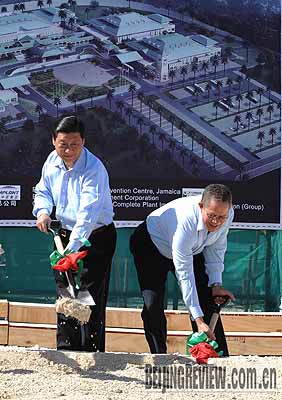| Senior Chinese leaders embarked on foreign trips soon after China's Spring Festival. Premier Wen Jiabao visited Switzerland, Germany, Spain, Britain, and the EU headquarters in Brussels from January 27 to February 2, after attending the World Economic Forum in Davos, Switzerland. From February 10 to 17, President Hu Jintao toured Saudi Arabia and four African countries-Mali, Senegal, Tanzania and Mauritius. Vice President Xi Jinping traveled to Mexico, Jamaica, Colombia, Venezuela and Brazil, plus Malta. Vice Premier Hui Liangyu visited four other Latin American countries-Argentina, Ecuador, Barbados and the Bahamas-from February 7 to 19.
 |
|
JOINT WORK: Visiting Chinese Vice President Xi Jinping (left) and Jamaican Prime Minister Bruce Golding attend the groundbreaking ceremony for the Montego Bay Convention Center, which is contracted to be built by a Chinese company, in Montego Bay, Jamaica, on February 14 (HANG JINGWEN) | These high-level visits, which received extensive coverage in foreign media, not only represented China's first diplomatic forays in 2009, but also advanced China's crisis diplomacy as the world struggles with the global financial crisis.
Currently, the world is undergoing the most profound changes since the end of the Cold War. The world order is shifting to accommodate rising powers, creating a multi-polar world. Major powers are scrambling to adjust their strategies. Global problems have become more complicated, while regional issues emerge one after another. The ongoing financial crisis is challenging development everywhere. In this context, China is drawing itself closer to the world, and the world has higher expectations for China. Frequent foreign visits by Chinese leaders thus can help the international community cope with the crisis together. They also publicize China's peaceful development and its measures to address the crisis. Therefore, Chinese diplomacy will help the world economy resume stable growth sooner than otherwise.
During these trips, Chinese leaders exchanged views with their counterparts of other countries on coping with the financial crisis and reviving the world economy, while stating China's responsible and constructive stance. In the face of the global financial crisis, China chooses to challenge it rather than cowering. These visits reflected China's growing diplomatic initiative and were of profound influence.
They also reflect China's diplomatic strategy in the new century. China will continue to interact with the world, making plans according to changing domestic and international situations. The impact of the global financial crisis is becoming more apparent as time goes by. China's economic growth has slowed, its exports have declined and unemployment has leaped. The Chinese Government considers sustaining stable and fast economic growth its top priority, issuing an economic stimulus package worth 4 trillion yuan (about $586 billion) to sustain economic growth, boost domestic demand and adjust economic structure. The Central Government has also adopted new policies related to financial reform, taxes, industrial support and social welfare programs.
To realize stable and fairly rapid growth of the Chinese economy, the country needs to find a new mode of economic development so as to guarantee balanced and coordinated development of investment, consumption and exports. Through these visits, China can foster a friendly international environment for domestic growth by tying domestic and foreign demands together.
The diplomatic flurry of top Chinese leaders was aimed to increase China's voice in world economic affairs and encourage the international community to conquer the ongoing financial crisis. Wen thus called his trip to Europe a "confidence tour." He stressed confidence, cooperation and responsibility repeatedly at important international events and stated China's prescription for the financial crisis. In April, China will participate in the Group of 20 economic summit in London, where it will discuss with other countries how to promote cooperation and coordination as well as establish a new international financial system.
Moreover, the visits were in accordance with China's global strategic blueprint, as they covered developed countries in Europe and developing countries in the Middle East, Africa and Latin America. The EU is now China's top trade partner, with bilateral trade volume exceeding $420 billion in 2008. The financial crisis has made trade cooperation and mutual political trust even more important to both China and Europe. Countries in the Middle East, Africa and Latin America are also important political and economic partners. The recent visits strengthened China's relationships with these countries and promote cooperation in trade, energy and investment.
The author is deputy director of the Center for Strategic Studies, China Institutes of Contemporary International Relations |
